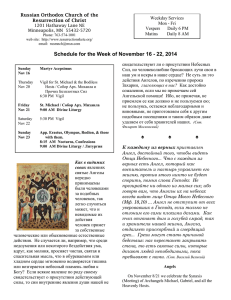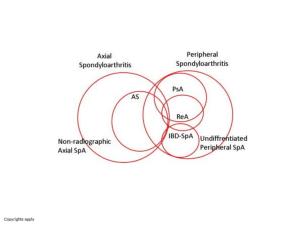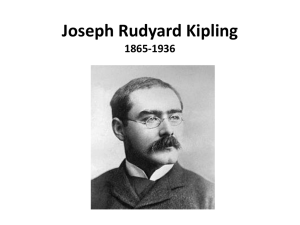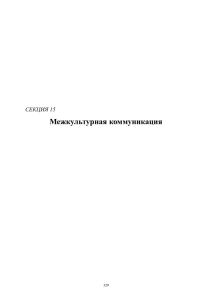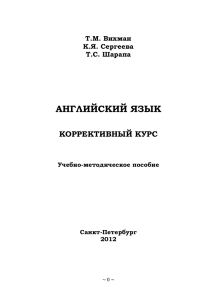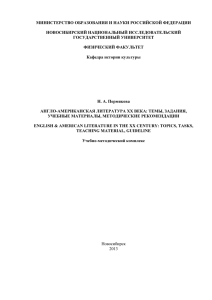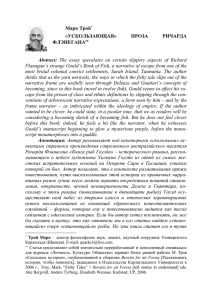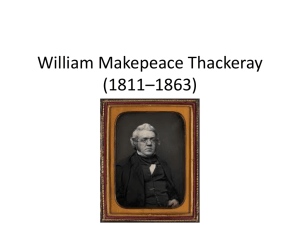“положить зубы на полку–literally, “to put your... shelf)”. Автор дает эквивалент такой ...
реклама
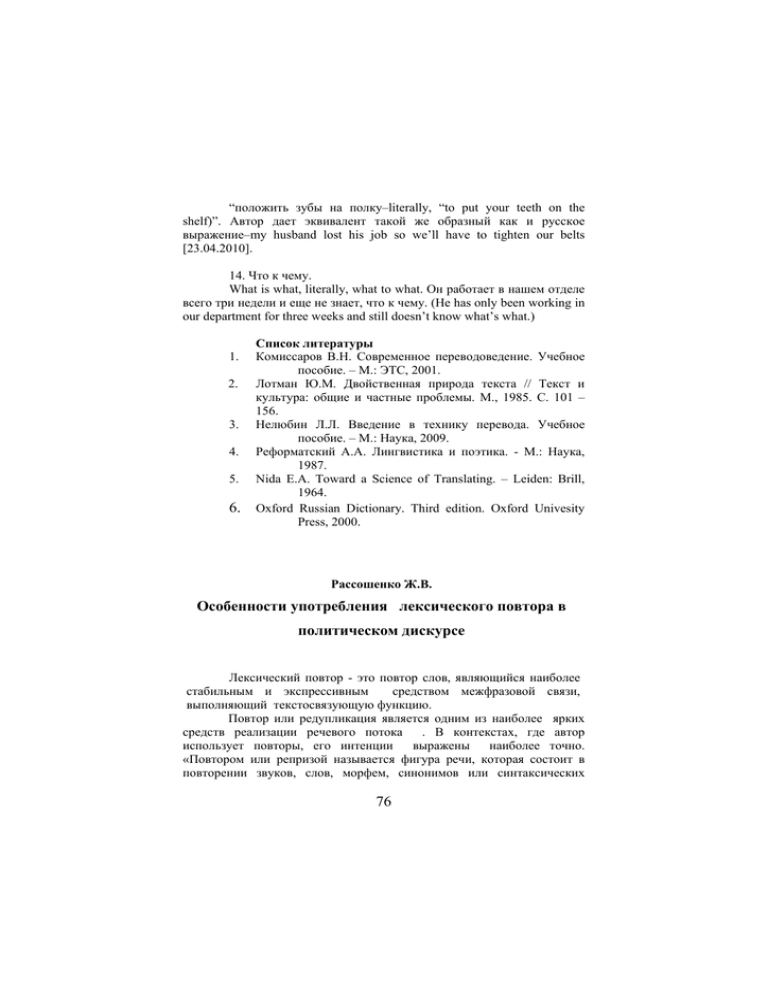
“положить зубы на полку–literally, “to put your teeth on the shelf)”. Автор дает эквивалент такой же образный как и русское выражение–my husband lost his job so we’ll have to tighten our belts [23.04.2010]. 14. Что к чему. What is what, literally, what to what. Он работает в нашем отделе всего три недели и еще не знает, что к чему. (He has only been working in our department for three weeks and still doesn’t know what’s what.) 1. 2. 3. 4. 5. 6. Список литературы Комиссаров В.Н. Современное переводоведение. Учебное пособие. – М.: ЭТС, 2001. Лотман Ю.М. Двойственная природа текста // Текст и культура: общие и частные проблемы. М., 1985. С. 101 – 156. Нелюбин Л.Л. Введение в технику перевода. Учебное пособие. – М.: Наука, 2009. Реформатский А.А. Лингвистика и поэтика. - М.: Наука, 1987. Nida E.A. Toward a Science of Translating. – Leiden: Brill, 1964. Oxford Russiаn Dictionary. Third edition. Oxford Univesity Press, 2000. Рассошенко Ж.В. Особенности употребления лексического повтора в политическом дискурсе Лексический повтор - это повтор слов, являющийся наиболее стабильным и экспрессивным средством межфразовой связи, выполняющий текстосвязующую функцию. Повтор или редупликация является одним из наиболее ярких средств реализации речевого потока . В контекстах, где автор использует повторы, его интенции выражены наиболее точно. «Повтором или репризой называется фигура речи, которая состоит в повторении звуков, слов, морфем, синонимов или синтаксических 76 конструкций условиях достаточной тесноты ряда, т.е. достаточно близко друг от друга, чтобы их можно было заметить. Так же, как и другие фигуры речи, усиливающие выразительность высказывания, повторы можно рассматривать в плане расхождения между традиционно обозначающим и ситуативно обозначающим как некоторое целенаправленное отклонение от нейтральной синтаксической нормы, для которой достаточно однократного употребления слова» [Арнольд, 1981; с.182]. К предметно-логической информации повтор, как правило, ничего не дополняет. Но повторы передают значительную дополнительную информацию эмоциональности, экспрессивности и стилизации и , кроме того, служат важным средством связи между предложениями, а иногда предметнологическую информацию трудно отделить от дополнительной. Повторяться могут элементы разных уровней и, соответственно, классифицируются повторы в зависимости от того, какие элементы повторяются. С точки зрения Л.П.Якубинского, восприятие активизируется благодаря тому, что «повторы задерживают внимание на определенных участках синтагматической цепи» [1986]. Речевая коммуникация, как известно, организуется посредством коллигации и колокации. Коллигация определяется индивидуальным значением слова и проявляется в рамках свойственной языку коллигации. Между этими двумя аспектами синтагматики слова существует диалектическое единство. Это и предопределяет появление в тексте повторений, как на синтаксическом, так и на лексическом уровне. Каковы же основные причины появления повторов в тексте? По мнению П.Ю.Моисеевой [1999], «в речевой цепи элементы выстраиваются друг за другом в зависимости от совокупности их синтаксических и лексических характеристик. Синтаксис без семантики или семантика без грамматики не обеспечивают понимания. Но основными причинами, обеспечивающими появление повторов в тексте можно считать: «стремление к усилению эмоционального воздействия на читателя или слушателя; желание замедлить повествование, что дает возможность читающему или слушающему более внимательно следить за системой и развитием мысли и аргументации; активизация восприятия» [Моисеева, 1999]. Проблема повтора привлекает внимание многих исследователей, и количество работ, посвященных повтору, постоянно растет. Большой интерес представляет задача разграничения повтора, как выразительного средства и стилистического приема, с одной стороны, и повтора, как средства, обеспечивающего связность целого 77 текста, - с другой. Необходимо отметить, что обе стороны рассмотрения повтора для нашего исследования представляются интересными, поэтому мы будем рассматривать их в совокупности, делая лишь формальное разграничение. Повторение целых высказываний стягивает текст и, в то же время создает атмосферу напряженности, придавая большую выразительность: -.MR. FLEISCHER: Tomorrow we'll give a look ahead; every Friday I'm going to give a look ahead. -.Q Ari, does the cataloging of some of what's missing or been vandalized, does that extend to Air Force One MR. FLEISCHER: I haven't looked at the cataloging, so whatever took place, we'll know it took place and we're going to leave it at that. -.MR. FLEISCHER: We're not looking back to place blame; we're not looking back to ascribe motive. -.Q Ari, if there was all this renovation that went on, how do we know, or how do you know if phone lines were cut or if things were damaged that it couldn't be a by-product of tearing up rugs and carpets and repainting and moving furniture around? (Press Briefing by Ari Fleisher. January 25, 2001. Washington, D.C.) -.MR. FLEISCHER: Hello, troops. Good afternoon. I have two personnel announcements to begin with. President Bush today announced his intention to nominate Mark A. Weinberger as Assistant Secretary of Treasury for Tax Policy. And President Bush today announced his intention to nominate Dr. Paul Wolfowitz as Deputy Secretary of Defense. News releases will be circulating after today's briefing. (Press Briefing by Ari Fleisher. February 5, 2001. Washington, D.C) -. It expires tomorrow, and it shall expire tomorrow. 78 -. MR. FLEISCHER: All available debt. All available debt. And that's a reflection of the fact that there are some bonds that are two-year or three-year issues that are longer-term bonds, and it makes no economic sense to pay those off before they're due. -.But again, the new Washington the President is seeking to create is going to try to tone that down, to create more civility and less rancor. It will happen. It will happen from all parties, from time to time. (Press Briefing by Ari Fleisher. March 2, 2001. Washington,D.C.) -. That doesn't mean it won't happen. It doesn't mean it will happen, but the circumstances that I announced jointly when I was there say, 'I worked this out with both Sharon and Arafat,' those circumstances have not yet been met. (The Vice President Appears on Face the Nation-CBS. March 24, 2002) -. Q They've announced several key ministries: The Defense Ministry; they appointed a defense minister, they appointed the foreign minister. (Interview to the Vice President by BBC. November 15, 2001) That is why I think the President was right to send General Zinni there, that is why I think it is important that America and ourselves and everyone came behind the recent United Nations resolution calling upon both sides to cease the violence and we have simply got to reconstitute a proper political process there is no other way of doing it. (ISRAEL AND THE PALESTINIAN AUTHORITY. Interview given by Prime Minister Tony Blair for NBC.4 April 2002.) Довольно часто встречаются повторы отдельных слов или словосочетаний: -. MR. FLEISCHER: The President proposed a tax plan that he believes is the best tax plan for the country, both to give people their money back that they paid in high taxes to return the tax surplus to the voters before the politicians can spend it, and also to promote economic growth. 79 -. Now, we are hearing from a number of people in the Congress, given the economic slowdown, the importance of making it retroactive, and you heard the President and his support of that today. Now, there are two principal ways that you can impact the effective date of the tax cut and then there's a third way that actually gets more benefit to taxpayers sooner. -. We also believe, by the way, that because of the trend in retiree health care plans being dropped by employers, that if someone makes a decision to not have coverage at age 65, that they should have the ability to opt into the Medicare program if their plan is subsequently dropped, which our plan does provide for. -. I think they will be talking about other reforms to the program, and I think with that in mind, we'll see both occurring, mostly because many members, both Democrats and Republicans, think we should have at least a down payment on some reforms. -. So I think it's at this point, I would not make the kind of judgment that I've seen there. I think it's , I can't validate it, verify it. -. Well, we know he can do more than he has. We know that they've not yet made a 100 percent effort to contain the violence on their side. -. Now maybe they wouldn't say anything positive about Saddam Hussein to me anyway, but--but I've dealt with most of these folks now for many, many years, going back at least to the Gulf War crisis. (Interview to the Vice President by BBC. November 15, 2001) Thank you, all. Sit down, please. Well, thank you very much, General. I appreciate those kinds words and I appreciate your warm welcome. I'm glad I came back to West Virginia. (Applause.) This is a state of good people. (Applause.) Good folks. Down to earth folks. (Applause.) And I'm glad to be in your midst again. ( G.W. Bush, Yeager Field Charleston, West Virginia Office of the Press Secretary, February 14, 2001) Today, America calls on Colin Powell again. He is a leader who understands that America must work closely with our friends in times of calm if we want to be able to call upon them in times of crisis. He understands that our nation is at its best when we project our strength and purpose with 80 humility. He understands that if we do not set our own agenda, it will be set by others, by adversaries abroad, or by the crisis of the day. (G.W. Bush.Remarks by the President and Secretary of State Colin Powell at Swearing-In Ceremony. January 26, 2001, The Oval Office) Повтор отрицаний является характерным приемом для политического дискурса, так как он вносит оттенок категоричности: -. None are racially segregated, Ari, I've checked it. None of them are racially segregated. Повтор союзов как бы стягивает текст, делает его более емким: -. Why don't I close with that, because I think I will just take any questions you have about both the issue itself, the report, and any other issues you have around Medicare reform and the chances for passage this year, which we still think are quite good. -. And the reason why it's quite troubling is that it appears that if you look at the tax cuts assumed in the budget resolution, and you see their unrealistic growth rate assumptions that they're contemplating, that the tax cuts will eat up all available resources and more, leaving little to nothing for a prescription drug benefit in the second five years. And so we want to make sure that one of the answers to the questions we raise is, is it adequately financed for the short-and the long-term, and is it more than an empty promise. -. And if I'm wrong on that, I will call you later. But I know it is virtually, if not completely, done, and I had understood it has been conveyed to the Hill -- to the Labor Committee -. And also, you say that they're not providing enough funding because their budget assumptions are unrealistic and there are too much taxes, but that's their budget. And they're not going to pass another budget for you for prescription drugs. -. And the judge, as to whether or not they've met those terms, is to be General Zinni, our special Mideast negotiator who's in the midst of those discussions between the Palestinians and the Israelis. 81 (The Vice President Appears on Face the Nation-CBS. March 24, 2002). Список литературы 1. Арнольд И.В. Стилистика современного английского языка. Л., Просвещение, 1981 2. Моисеева И.Ю. Семантические повторы как средство экспликации авторских интенций //Вестник Оренбург. Гос. пед . ун-та. Гуманитарные науки. - Оренбург, 1999.-№3 3. Якубинский Л.П. Избранные работы. Язык и его функционирование.-М.: Наука, 1986. 4. Press Briefing by Ari Fleisher. January 25, 2001. Washington, D.C. 5. Press Briefing by Ari Fleisher. February 5, 2001. Washington, D.C 6. Press Briefing by Ari Fleisher. March 2, 2001. Washington,D.C. 7. The Vice President Appears on Face the Nation-CBS. March 24, 2002. 8. Interview to the Vice President Cheney by BBC. November 15, 2001. 9. G.W. Bush.Remarks by the President and Secretary of State Colin Powell at Swearing-In Ceremony. January 26, 2001, The Oval Office 10. G.W. Bush, Yeager Field Charleston, West Virginia Office of the Press Secretary, February 14, 2001 11. ISRAEL AND THE PALESTINIAN AUTHORITY. Interview given by Prime Minister Tony Blair for NBC.4 April 2002. 82

